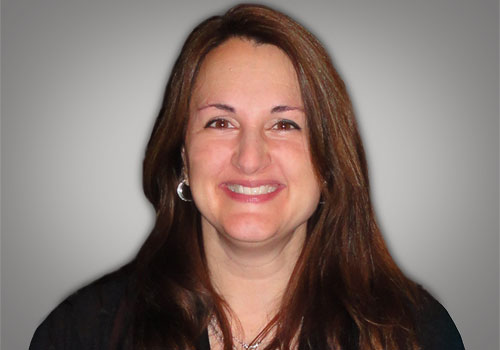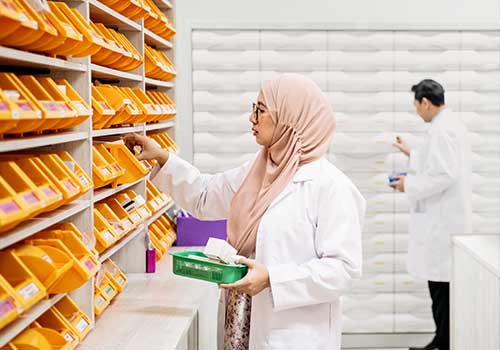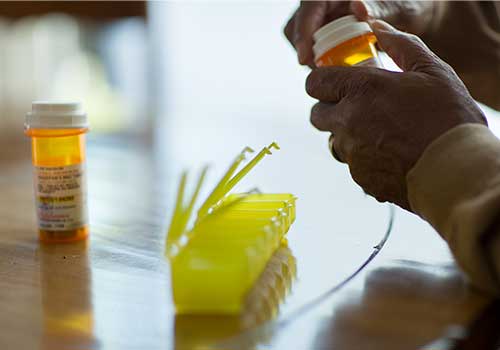October is American Pharmacists Month, recognizing the invaluable contributions of pharmacists and technicians and their role in the community. Hear from five Optum employees who are advancing patient care and experience:
- Hamida Hossaini, Manager of Pharmacy Operations, Optum Fulfillment of Integrated Pharmacies
- Melanie Riggs, Clinical Pharmacist Patient Care, Optum Health
- Heather Proffitt, Clinical Pharmacist, Optum Specialty Pharmacy
- Mohammed Zakiuddin, Clinical Pharmacist Patient Care, Optum Rx
- Dieu Chau, Pharmacy Site Manager, Genoa Healthcare
Hamida Hossaini, Manager of Pharmacy Operations, Optum Fulfillment of Integrated Pharmacies
“I always knew I wanted to be a pharmacist so I can help people,” says Hamida Hossaini, manager of pharmacy operations, Optum Fulfillment of Integrated Pharmacies, based in Long Island City, New York. “I remember my dad asking the pharmacist at the counter once how she liked her career. She said, ‘I love my job because we get to help people.’”
From a young age, Hamida knew the impact of helping, and being helped. As a baby, Hamida, her parents and her three siblings fled their home during the Soviet invasion of Afghanistan. Her family was accepted as refugees and began establishing a new life in New York, with some of the family knowing little to no English. Hamida’s younger brother was born in the U.S., but the rest of the family worked very hard to become U.S. citizens.
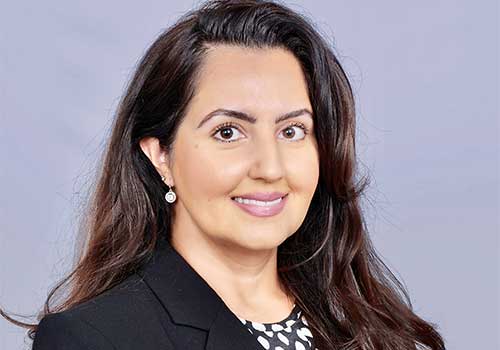
Starting as young as six years old, she recalls assisting her non-English speaking mom and grandparents at the pharmacy: “I used to go with my mom to the pharmacy to communicate with the pharmacist that we were there to pick up my grandparents’ prescriptions. I used to always help my grandparents sort and organize their medications.”
Hamida’s lifelong dream became a reality when she began her pharmacy career and then accepted a job at Optum, where she currently manages filling, storing, packing and shipping patients’ specialty medications. Specialty medications are drugs that treat cancer, Crohn’s disease and ulcerative colitis, cystic fibrosis, HIV, multiple sclerosis, psoriasis and other chronic conditions.
With her childhood experiences in mind, Hamida and her team ensure the pharmacy has the medications their patients need, when they need them.
“It’s very important that when we say a medication is coming to a patient, it is coming,” she says. “The medications we ship are potentially life-saving medications that the patients need to live. The process can be stressful, which I personally know because my mom is one of these patients. Two years ago, my mom was diagnosed with idiopathic pulmonary fibrosis and was given five years to live. I know these patients are anxious to receive their medication and we want to remove stress for them.”
Hamida credits her parents for being her inspiration to help others, work hard and follow her dreams.
“I’m so grateful for all the opportunities I’ve received in my life and throughout my career that brought me here,” she shares. “But the best part of my job is knowing, every single day, that I helped so many patients — that if it were not for this field, I would not be able to help so many people. Knowing that God put me here in this position to help all these patients makes me feel so good.”
Melanie Riggs, Clinical Pharmacist Patient Care, Optum Health
Some experiences in life forever change our perspective — they become imprinted in our hearts and minds. For Melanie Riggs, a Las Vegas-based pharmacist for Southwest Medical Associates within Optum Health, that moment came when her dad had a heart attack.
At the time, Melanie’s dad was participating in a clinical study on blood pressure medication. The study’s doctors decided to take him off his medications, which resulted in the heart attack, a terrifying moment that Melanie has carried with her in the 20 years since her father’s recovery. She speaks to the close relationship they share when she shares that her dad is her number one cheerleader, and her number one patient.
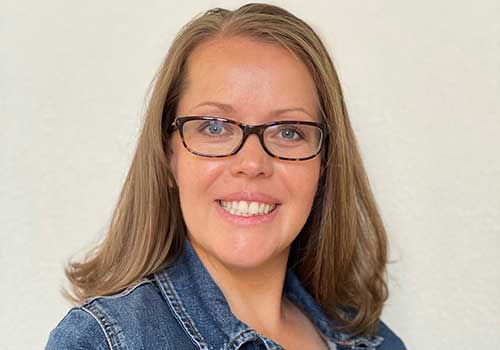
“I’ve always had a special interest in cardiology and medicine, because if they had not taken my dad off his medication, chances are he never would have had that heart attack,” Melanie says. “It’s amazing we can prolong peoples’ lives by keeping them on their drug regimens.”
Through this personal experience, Melanie is using her compassion and understanding to help others with their own heart health. For the past year, she has been part of a congestive heart failure (CHF) pilot program that analyzes prescriptions CHF patients are taking and makes medication recommendations for potentially better health outcomes.
Melanie and her team take these recommendations directly to the patients’ cardiologist or primary care physician to determine the future course of each prescription regimen. So far, the pilot has received an outstanding 100% response rate, meaning providers end up adjusting prescriptions based on the pharmacists’ recommendations. These adjustments potentially prevent serious health complications and contribute to longer, healthier lives for patients. The success of the pilot program gives Melanie hope that it will expand in the future.
“Some of our patients are part of the sickest populations and we can do a lot of things to help them,” she says. “The CHF pilot is one way that we can do that, but we can grow this pilot program to other disease states and really help the patients that need it the most.”
Melanie’s passion for her work extends beyond the CHF pilot. She is sharing her expertise and providing training to the rest of the pharmacy staff on how to complete CHF prescription reviews. She also takes pride in leading an education subcommittee for Optum Health which furthers the knowledge base and develops skills for the pharmacy team as new guidelines are issued. The subcommittee also implemented “Good Catches” to highlight team members who have identified and corrected possible medication problems or harmful drug interactions for patients.
Between the CHF pilot and education subcommittee, she is focused on making the health care system work better for every one of her patients, including her dad: “If there’s anything we can do to help, then I want to do that. I don’t want anyone to fall through the cracks.”
Heather Proffitt, Clinical Pharmacist, Optum Specialty Pharmacy
Based in New Albany, Indiana, Heather Proffitt, an Optum Specialty Pharmacy clinical pharmacist, has always had a passion for teaching, but her true “jam in life” is helping people.
"I love pharmacy and building relationships with the patients and the people you work with,” Heather shares. “Being a pharmacist means really being there for someone, connecting with them, and helping them. It’s the reason why I picked pharmacy – to help people.”
After starting her pharmacy career, Heather wanted to find a way to blend her love of helping people with her passion for teaching.
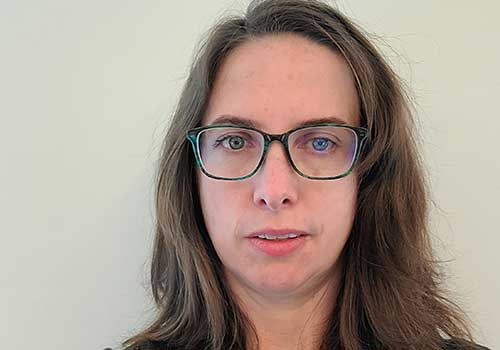
“I started going to my supervisor and saying, ‘You know what would be the greatest job in the world? If I could just talk to patients all day and teach pharmacy students. That would be amazing! I think I would be good at that,’” Heather says.
When an opportunity arose that would allow her to continue working with patients while also training and mentoring pharmacy students in an Optum pharmacy, Heather knew she had found her calling.
“If I do my job extremely well when taking care of patients, they start to trust the Optum name and know that we’ll be there for them,” she explains. “I’m training my students on how to take excellent care of patients and teaching them how rewarding it can be. If I do my job well with teaching, then I’m taking care of even more patients than just me alone calling patients.”
Heather takes pride in knowing her student mentoring will have a positive, long-term impact on people’s lives. To date, she has shared her expertise and passion with more than 30 pharmacy students training in a real-world setting.
“I try to instill my love of pharmacy in my students and teach them that it’s the connection with our patients that makes a difference,” Heather says. “In one instance, I was following up via phone with a multiple sclerosis patient who was a painter. When I called, he was working outside and getting dehydrated from throwing up multiple times. He thought I would tell him to get a sports drink and was surprised when I told him to go to the hospital immediately. I was so concerned after talking with him that I called the next day to check in. He said, ‘thank you,’ that the emergency physician agreed he needed to be there, and he was able to get his fluids and electrolytes replenished. On top of that, his boss now has him working in the shade so that it doesn’t happen again.”
In addition to her love of pharmacy, Heather tries to instill two other pieces of advice in her students. She encourages them to be fully present wherever they are – at home or at work. And to “know your values and what is important to you, and operate with those in mind.” One of Heather’s core values, make a difference, clearly shines through in her daily interactions with her patients and students.
Mohammed Zakiuddin, Clinical Pharmacist Patient Care, Optum Rx
“Health and health care were a big part of my life when I was young,” says Mohammed Zakiuddin, Optum Rx clinical pharmacist, Patient Care, based in Schaumburg, Illinois. “I had asthma and my grandparents, who lived with us, were on a lot of medications for various conditions. I’d often go to the doctor, or accompany my grandparents, and it made a big impression on me. You are sick or in pain, and the doctor can help you get healthy. That had a huge influence on me. I always knew I’d be involved in health care, and when my cousin became a pharmacist, I saw my life’s direction.”
Mohammed conducts medication reviews over the phone with Optum Rx patients to confirm their treatments provide benefit and helps them better understand how best to use their therapies.“

“Our typical patients are on Medicare, seeing multiple physicians and taking 10 to 20 medications,” he explains. “These medication reviews are important in identifying risk for adverse effects from the combinations of drugs patients take — including over-the-counter and prescription medications. In addition, we highlight best practices and we give the level of education each patient needs.”
Many medications require routine monitoring and Mohammed helps educate members on the importance of getting the necessary testing to facilitate better health outcomes.
“We work together — the pharmacist, member and provider — to determine what, if any, changes are necessary with the member’s medications,” Mohammed shares. “The resulting shared-decision process gives members a voice in their care.”
The consultations Mohammed conducts also identify barriers to care, including their access to transportation. If patients are unable to access their medications, they are less likely to maintain their treatment regimen. This is where Mohammed’s team will intervene and help patients find solutions, such as Optum Home Delivery for unreliable transportation, to those barriers. These solutions lead to better health outcomes by focusing on quality, advocacy and access — ultimately lowering the cost curve through health improvements.
“The most amazing part of my job is that I’m directly helping people one-on-one,” he says. “While much different than a retail or hospital setting, I have found pharmacy consulting so rewarding. There is nothing more gratifying than knowing you helped a member take the right steps toward improving their health. That is what motivates me each day.”
Mohammed often remembers the days of his childhood and the positive impact clinicians had on him and his grandparents: “At Optum, we are definitely going in the right direction with how we care for our members. We are really making a positive difference.”
Dieu Chau, Pharmacy Site Manager, Genoa Healthcare
”To help people and call it work is truly a blessing,” says Genoa pharmacy site manager Dieu Chau, who is based in Laguna Hills, California. It is a mantra she lives by every day as she fills, manages and distributes medications for patients who have behavioral health and substance use disorders, and others who have complex, chronic health conditions.
“Each Genoa pharmacy is built to serve the community we are in,” she shares. “We specifically tailor our pharmacy services to patient needs and address any barriers to care they may be facing. This approach empowers me as a pharmacist to use my expertise to truly care for my consumers in the best way possible.”
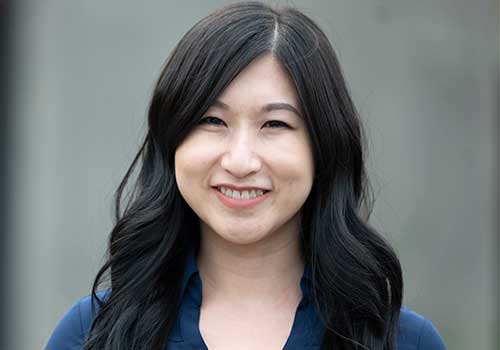
One of Dieu’s patients struggled for years to juggle over 20 separate medications across multiple pharmacies. Sometimes the patient would accidentally drop pills on the floor, place them in the wrong case or struggle to find reliable transportation to pick up her medications — further contributing to her stress and anxiety. Dieu noticed the patient was feeling alone and overwhelmed in her illness, and found a way to help.
“The patients’ prescriptions were all over the place with differing refill dates,” Dieu recalls. “We transferred everything over to Genoa and consolidated all her medications. As we lined up her medications, I would give her a pre-packaged pill organizer once a week and outline everything she needed to take and how. I met with her every week for about a month until her medications were lined up and easier for her to manage.”
The patient was overwhelmed with gratitude and wrote a glowing note for Dieu. “Now that I have Genoa as my pharmacy, I don’t have to worry about running out of my medications or traveling to get them. The staff is a great blessing to me. They are very kind, patient and thorough — they explain everything in a way I understand.”
This is one of many instances Dieu experiences daily. Not only does Dieu keep track of medications, she also monitors her patients’ cancelled appointments and reschedules to keep them on track, and notifies providers when patients are not meeting medication adherence.
“Patients need to stay on their medications so they can be treated and continue to live a healthy life,” Dieu explains. “Staying on medications leads to better health outcomes for patients, keeps them out of hospitals and leads to more happiness and fulfillment.”
For Dieu, that happiness comes from helping others: “I realize that even little things that we can do for others can be a great blessing.”
Related content
Articles and blogs
How to manage medication overload
Hear from a leader's perspective on managing polypharmacy.
Articles and blogs
Fighting the tide of opioid overdose
Optum home delivery successfully tackles opioid abuse.
Articles and blogs
The dangers of polypharmacy
Millions of workers at risk due to overprescribed drugs
STATEMENT REGARDING FINANCIAL INFLUENCE:
This article is directed solely to its intended audience about important developments affecting the pharmacy benefits business. It is not intended to promote the use of any drug mentioned in the article and neither the author nor Optum Rx has accepted any form of compensation for the preparation or distribution of this article.

